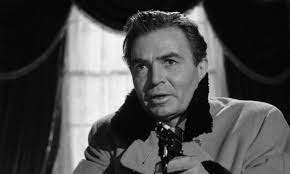The neat phrase “picnic, lightning” is a metaphor for transience and happenstance written by Humbert Humbert, the narrator of Lolita (1955). Awaiting a murder trial, Humbert begins a memoir, freely admitting moral decline and obsession with the fourteen-year-old Dolores Haze, aka Lolita.
But tucked away in Humbert’s deepest memory is a recollection of his mother, who died “in a freak accident (picnic, lightning) when I was three.” He writes that this bit of memory is the only “pocket of warmth in the darkest past.” At this fateful picnic, he says, “the sun of my infancy had set,” a sly way of blaming his degradation on his mother. Of course, once you know his story, you know that he’s unworthy of sympathy. Humbert implies the event has since controlled his life and actions. However, his mother’s loss is a heavy burden to place on a picnic and an accident by an untrustworthy narrator.
Featured Image: James Mason as Humbert Humbert in Stanley Kubrick’s Lolita (1955).
See Vladimir Nabokov. Lolita. New York: Random House, 1955. Other picnics are described in Ada or Ardor, a Family Chronicle. New York: McGraw Hill, 1969; “A Bad Day,” In The Stories of Vladimir Nabokov. New York: Vintage, 1996. Nabokov, Vladimir; and “The University Poem [1926] “In Selected Poems. New York: Alfred A. Knopf, 2012; Stanley Kubrick. Lolita (1962). The screenplay by Vladimir Nabokov is based on his novel; Adrian Lyne. Lolita (1997). The script by Stephen Schiff is based on Nabokov’s novel.

